To some parents, teachers and youth workers, the phrase “teen rebellion” may seem redundant. At times it does seem that adolescence is synonymous with rebellion.
Teenage rebellion occurs for many and varied reasons. In some cases, it is simply an awkward expression of an adolescent’s stumbling progress toward adulthood. However, in many cases adolescent rebellion also stems from a number of roots, among which may be a poor relationship with parents, an effort to communicate, a need for control, a lack of boundaries and expectations, an expression of anger and aggression, and the absence of an honest and vulnerable model.
As has been said, all adolescents are likely to rebel in one way or another. Rebellious thoughts and behavior are not only common, but they are also natural. Such rebellious tendencies can even be beneficial in helping teens to grow toward independence and their parents to adjust their expectations and practices. However, prolonged rebellion can be both dangerous and harmful to both parent and child.
Counseling rebellious and delinquent youth is a very difficult, slow and often frustrating task. Success might be marginal at best. Though attempting to help and guide a rebellious youth is indeed a challenge, the sensitive and discerning adult may be able to offer help in the following ways discussed in this article.
